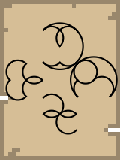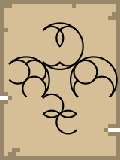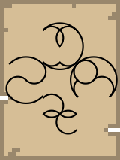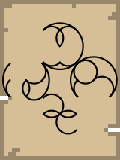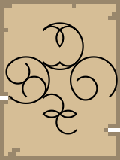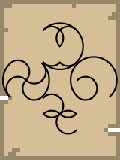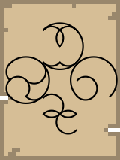v0.13:Symbols
v0.13 · Older This article is about the current version of Mystcraft. |
Symbols are key to creating Ages with a Descriptive Book in Mystcraft. Symbol define aspects of the Age created, allowing for customization and eliminating randomly decided aspects of the book's Age.
See Writing for how to use these symbols effectively.
Contents
Finding Symbols
Symbols can be discovered a couple ways. The first and most basic way is finding a village containing a Archivist; The Archivist's house will also contain a couple pages. The second and most common way to find Symbols would be to explore an age. Ages will have randomly spawning temples made of cobblestone that will contain several pages and possibly some Sealed Notebooks. The third and final way would be to explore dungeons. Dungeons have a chance to contain symbols and sealed notebooks. Verify
Pages
Symbols come on sheets of paper, called pages. As of 0.12.3.00 pages do not vary in quality or condition. Symbols can be written to paper or pages using a Writing Desk.
Kinds of Symbols
Biome Distributions
Biome controllers dictate the layout of biomes in an age. Every age requires exactly one Biome Controller. They take varying numbers of biomes as modifiers: If not enough biomes are provided, some will be selected randomly but where "minimum #" is noted, there is no upper limit. In recent versions, any biome not used by a biome controller (excess or after the controller symbol) is usually supplied with a Floating Islands symbol. The Floating Islands symbol itself does not cause instability -- but, it will likely choose a terrain block, and if it picks an ore or other valuable block, that can cause instability.
| Symbol | Name | Notes |
|---|---|---|
| File:Huge Biome Distribution.png | Huge Biome Distribution | Accepts minimum 3 biome modifiers, generates extremely large biomes. |
| File:Large Biome Distribution.png | Large Biome Distribution | Accepts minimum 3 biome modifiers, generates large biomes. |
| File:Medium Biome Distribution.png | Medium Biome Distribution | Accepts minimum 3 biome modifiers, generates average sized biomes. |
| File:Small Biome Distribution.png | Small Biome Distribution | Accepts minimum 3 biome modifiers, generates small biomes. |
| File:Tiny Biome Distribution.png | Tiny Biome Distribution | Accepts minimum 3 biome modifiers, generates extremely small biomes. |
| File:Tiled Biome Distribution.png | Tiled Biome Distribution | Accepts minimum 2 biome modifiers, generates alternating biomes per chunk. (Heightmap varies per 4x4 chunks.) |
| File:Grid-form Biome Distribution.png | Grid-form Biome Distribution | Accepts minimum 2 biome modifiers, generates alternating biomes per chunk. (Heightmap varies on every chunk.) |
| File:Single Biome Distribution.png | Single Biome Distribution | Accepts exactly 1 biome modifier, generates an infinite single biome. |
| File:Native Biome Distribution.png | Native Biome Distribution | Accepts 0 biome modifers, generates biomes in the same configuration as the Overworld. |
Celestials
Celestial Bodies are objects in the sky, such as Suns, Moons, and Stars. Every age requires at least one Sun, moon, and stars symbol. Any of these can be Normal or Dark, but Stars have two additional options: Ender Starfield, and Twinkling Stars. If none of a body are specified, one or more will probably be added; if you really want "no X", you need to write "Dark X". Modifiers vary among the symbols:
* "Dark" bodies do not accept any modifiers, and do not display anything in the sky. A Dark Sun also does not provide "daylight" to prevent monster spawning, burn undead, etc. * "Normal" Suns and Moons each accept a Direction, a Length, a Phase, and optional sunset color. They cannot be recolored. * If a sun has no Sunset Color of its own, it can still be affected by a "global" Sunset Color modifier for the world. * Normal and twinkling Stars accept a Gradient for color, Direction, and Length, but not Phase. * Directions determine the direction from which the given object will rise. Lengths determine the duration of a full cycle (and thus, speed of motion). Phases determine where in the rotation cycle the object begins.
| Symbol | Name | Notes |
|---|---|---|
| File:Normal Sun.png | Normal Sun | This is the same sun as seen in the Overworld. Accepts Direction, Length, Phase, and Sunset Color. |
| File:Normal Moon.png | Normal Moon | This is the same moon as seen in the Overworld. Accepts Direction, Length, Phase, and Sunset Color. |
| File:Normal Stars.png | Normal Stars | This is the same starfield as seen in the Overworld. Accepts Direction, Length, and Color modifiers, (Gradients optional). |
| File:Dark Sun.png | Dark Sun | Effectively, "No Sun". |
| File:Dark Moon.png | Dark Moon | Effectively, "No Moon". |
| File:Dark Stars.png | Dark Stars | Effectively, "No Stars". |
| File:Ender Starfield.png | Ender Starfield | This is the same static field as seen in The End. Accepts Colors, (Gradients optional). |
| File:Twinkling Stars.png | Twinkling Stars | Stars that brighten and darken over time. Accepts Direction, Length, and Color modifiers, (Gradients optional). |
Effects
These symbols affect the world as a whole, and do not fit in the other categories. They accept no modifiers, except for Lightning.
| Symbol | Name | Notes |
|---|---|---|
| File:Accelerated.png | Accelerated | Adds extra random ticks to the world, causing things that occur on random ticks to occur more rapidly. Creates instability in an age. |
| File:Lightning Page.png | Lightning | Accepts Color or Gradient modifiers, which will control the color of the lightning. Adds stability to an age. |
| File:Meteors.png | Meteors | Adds meteors falling from the sky regularly, causing massive devastation. Besides being dangerous to players, this will eventually destroy almost everything in the age, though sturdy (obsidian) buildings may protect some areas. Adds stability to an age. |
| File:Scorched Surface.png | Scorched Surface | Causes all living entities exposed to the sky to catch aflame. Roofs will ensure player safety. Adds stability to an age. |
| File:Spontaneous Explosions.png | Spontaneous Explosions | Creates random explosions across the age. Besides being dangerous to players, this will eventually destroy almost everything in the age. The blasts can appear anywhere, including inside buildings with blast-proof walls. In particular, linkbooks cannot be protected, even if they are in stands or lecterns. Adds stability to an age. |
Lighting
Lighting changes the perceived light level of an age. Lighting symbols do not accept modifiers. Exactly one of the options is required. These symbols do not affect mob spawning; Bright ages still need to be lit up to prevent mob spawns. Similarly, Dark ages do not need more lighting than the Overworld to prevent mob spawns, however, their sunlight is not strong enough to burn undead or make spiders neutral.
| Symbol | Name | Notes |
|---|---|---|
| File:Bright Lighting.png | Bright Lighting | Enables players to see nearly as well as a Potion of Night Vision allows. This does not affect actual light level, only visibility. This symbol adds instability. |
| File:Normal Lighting.png | Normal Lighting | Accepts Color or Gradient modifiers, which will control the color of the lightning. Adds stability to an age. |
| File:Dark Lighting.png | Dark Lighting | Causes the age to appear far darker than it would be under normal lighting conditions. Full daylight will not be bright enough to kill off undead mobs or turn spiders passive. |
Visuals
Visual symbols change nothing related to gameplay, instead tweaking the visuals of an age such as Sky Color.
Many visual symbols accept modifiers, as noted on a per symbol basis. (Natural Visuals accept no modifiers and instead use the colors provided by the biome, usually mimicking the Overworld.)
| Symbol | Name | Notes |
|---|---|---|
| File:Boundless Sky.png | Boundless Sky | Removes the fog obscuring stars and such below the horizon level. Mainly useful in Void and Skylands ages. |
| File:Cloud Color.png | Cloud Color | Allows players to change the color of the clouds in the sky. Accepts Color and Gradient modifiers. |
| File:Fog Color.png | Fog Color | Allows players to change the color of all fog in the age. Accepts Color and Gradient modifiers. |
| File:Sky Color.png | Sky Color | Allows players to change the color of the age's sky when there is a sun visible in the sky. Accepts Color and Gradient modifiers. |
| File:Night Sky Color.png | Night Sky Color | Allows players to change the color of the age's sky when there is no sun visible in the sky. Accepts Color and Gradient modifiers. |
| File:Sunset Color.png | Sunset Color | Allows players to change the color of the sunsets in an age. Accepts Color and Gradient modifiers. If there is already a sunset modifier currently dangling this will append a gradient to the end of that. This symbol is primarily a modifier for a Sun to change the sunset color of that specific sun. If left dangling at the end of the book, this will set the age's default sunset for all suns without a defined sunset color rather than add instability. |
| File:Foliage Color.png | Foliage Color | Allows changing the color of leaves on trees in most biomes. Accepts Color modifiers, but not gradients. |
| File:Grass Color.png | Grass Color | Allows changing the color of grass in most biomes. Accepts Color modifiers, but not gradients. |
| File:Water Color.png | Water Color | Allows changing the color of water in most biomes. Accepts Color modifiers, but not gradients. |

|
Rainbow | Creates a rainbow in the sky. Accepts Direction modifiers. |
Weather
Weather symbols determine how the weather in an age will occur. They do not accept modifiers. Exactly one of the options is required.
| Symbol | Name | Notes |
|---|---|---|
| File:Normal Weather.png | Normal Weather | This symbol causes a similar weather pattern to the Overworld, but can only cause biome-appropriate weather. |
| File:No Weather.png | No Weather | This symbol prevents weather, no rain, storms, snow, or overcast skies. |
| File:Slow Weather.png | Slow Weather | This symbol causes very slow changes in the weather, but can only cause biome-appropriate weather. |
| File:Fast Weather.png | Fast Weather | This symbol causes rapid shifts in the weather, but can only cause biome-appropriate weather. |
| File:Eternal Weather.png | Eternal Weather | This symbol causes the age to always have biome-appropriate weather. |
| File:Eternal Rain.png | Eternal Rain | This symbol causes the age to be constantly raining, even in biomes that might not otherwise receive rainfall. This may alter what some mods see as the biome in the age. |
| File:Eternal Snow.png | Eternal Snow | This symbol causes the age to be constantly snowing, even in biomes that might not otherwise receive snowfall. This may alter what some mods see as the biome in the age. |
| File:Eternal Storm.png | Eternal Storm | This symbol causes the age to be constantly storming, even in biomes that might not otherwise receive rainfall. This may alter what some mods see as the biome in the age. |
World Feature
World Landscape
| Symbol | Name | Notes |
|---|---|---|
| File:Standard World.png | Standard World | Creates an age using the Overworld terrain generator. |
| File:Cave World.png | Cave World | Creates a cavern age using the Nether terrain generator. These ages still generate a flat top layer where the Nether ceiling would be, and so may be confused for Flat ages if the player spawns on the surface. ("Netherrack Block + Lava Block + Cave World" will not duplicate the nether; soul sand, gravel, and glowstone are missing.) |
| File:Island World.png | Island World | Creates a single floating island (slightly smaller than the main End island), with the option of using a liquid block as an infinite ocean, or if "No Seas" is used, floating in midair. |
| File:Flat World.png | Flat World | Creates a flat age. The height of the age is determined by the average height of all the biomes in the age. If the height is below sea level the land will be covered in whatever was chosen for the sea material (water by default). |
| File:Void World.png | Void World | Creates an empty age, save for the 5x5 spawn platform and any features used. Void World accepts no block modifiers for terrain or sea. Void ages can still contain features such as Mineshafts, Strongholds, and Villages, etc, if the features do not require terrain to spawn. Void ages are extremely dangerous without some sort of flight ability (from another mod). However, they represent the ultimate "blank slate" for a new base or construction. |
| File:Amplified World.png | Amplified World | Creates an age using the Overworld Amplified terrain generator, resulting in a vastly exaggerated heightmap. |
Modifiers
Modifiers allow for customizing other symbols by specifying things like colors or block types.
Modifiers are written before the symbol they modify, for instance Cyan Color ➡ Sky Color.
Angle Modifiers
Angle Modifiers are used for Celestial positioning. They define where on the horizon the celestial will rise.
Angles will consume other Angles and produce a point halfway between the two. North followed by West will produce a northwest angle. When more than two angles are blended, a rolling average will be used such as ((W + X) + Y) + Z.
In cases where there are two possible averages, the average will be clockwise from the first angle. For example, North ➡ South will result in East, while South ➡ North will result in West.
| Symbol | Name | Angle |
|---|---|---|
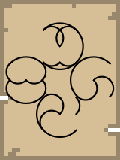
|
North Direction | 0/360 |
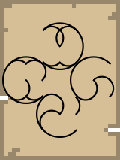
|
East Direction | 90 |
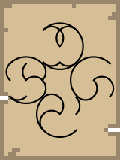
|
South Direction | 180 |
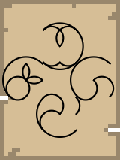
|
West Direction | 270 |
Biome Modifiers
Biomes are symbols that determine the ecosystem of an age. In the Overworld players can find biomes such as deserts, forests, mountains, plains, oceans and the like, all scattered across the world. The biome symbols allow players to pick and choose those ecosystems when creating their own ages. The vanilla biomes are listed below; biome pages can also appear for biomes provided by other mods and registered with Forge.
Biomes are modifiers, and must come before the biome controller, or another symbol that uses biomes. There is one other symbol which does so, Floating Islands. Floating Islands symbols will automatically be added for any “dangling” biomes (that is, not used by the biome controller). If a biome is needed but not supplied, a random choice will be made.
For all biomes, the “biome top” replacement (usually dirt and grass, biome specific) only happens if the world's base material is “Stone”; see “World Landscape” symbols above. Note that if this does not happen, trees and other vegetation will not appear regardless of biome.
There is one biome modifier page for each vanilla biome, and Mystcraft will also add any compatible biomes found from other mods. These pages will all follow the following format:
| Symbol | Name | Notes |
|---|---|---|
| File:Biome Name Biome.png | "Biome Name" Biome | When placed prior to a Biome Distribution page, (excluding Native Biome Distribution), or the Floating Islands feature page, the Age/Floating Island will use this biome in it's generation. If the material used for terrain/feature is "Stone Block", it will also generate any biome specific decoration and materials. |
Note: Some biomes may behave strangely when generated in a Mystcraft age. Examples below:
| Symbol | Name | Notes |
|---|---|---|
| File:Hell Biome.png | Hell Biome | Because of discrepancies in the way Minecraft handles biome and dimension based materials, this biome will generate with a base material of Stone by default. The biome does not confer the Nether's prohibition of water or beds, which is based on the Nether's dimension ID. |
| File:Ocean Biome.png | Ocean Biome | Water generates in this biome because it is generally low. If there is a section of this biome above Y 63, it will be grass as per any other normal biome.
This is true of all other Aquatic Biomes as well. |
| File:Sky Biome.png | Sky Biome | Because of discrepancies in the way Minecraft handles biome and dimension based materials, this biome will generate with a base material of Stone by default.
If the biome of the x,z coordinates 0,0 is Sky, the Enderdragon may spawn. |
| File:Mushroom Island Biome Page.png | Mushroom Island Biome | This biome generates with a top layer of Mycelium rather than Grass.
Minecraft's hostile mobs cannot spawn in Mushroom Island biomes. Due to a bug in Vanilla minecraft, caves and ravines will not break the surface mycelium. |
| File:The Void Biome.png | The Void Biome | This biome does not generate naturally in Minecraft, and is only usually accessed via The Void superflat preset. The biome is empty except for a single structure: a 33×33 stone platform with a single block of cobblestone in the center. No mobs (passive or hostile) can spawn without spawn eggs, spawners, or commands.
The rest of this biome will spawn flat, and typically contain grass. |
Block Modifiers
Color Modifiers
Gradients
Length Modifiers
Length Modifiers are used for Celestial movement, as well as Gradients. They define how quickly the celestial will orbit or how quickly colors will last. Lower values are faster, higher values are slower. Note that daytime is ½ of an orbit.
Lengths will consume other Lengths and produce a point halfway between the two. When more than two Lengths are blended, a rolling average will be used such as ((W + X) + Y) + Z.
Phase Modifiers
Phase Modifiers are used for Celestial positioning. They define where in the sky the celestial will start. This is especially relevant for celestials with fixed positions, but can also be used to have multiple celestials that rise at different times of the day.
Phases will consume other Phases and produce a point halfway between the two. When more than two Phases are blended, a rolling average will be used such as ((W + X) + Y) + Z.
In cases where there are two possible averages, the average will be forward in the cycle from the first angle. For example, Rising ➡ Setting will result in Zenith, while Setting ➡ Rising will result in Nadir.
